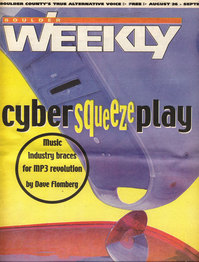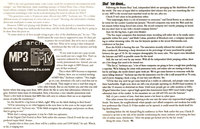Cyber Squeeze Play – Music Industry Braces For MP3 Revolution
September 1, 1999
(Tyler’s note: “MP4” was the commercial name given to the AAC music codec, which now serves as the technology used to encode iTunes Music files. Excerpts from the article follow)
“MP4 is the next generation music codec,” says Tyler Suchman, music marketing manager for Global Music one, a Santa Monica-based software company. GMO was founded by Anthony Stonefield, a pioneer in music compression technologies who cut his teeth developing this kind of software for AT&T.
“This generation codec is 30 percent more efficient than MP3,” Suchman says. “It’s a whole different means of compression at a lower bit rate of travel.” Meaning, the information is broken down into small parts so more can move at once.
However GMO isn’t playing with blinders on. They see this period as a transition between the costly way things have traditionally been done, and the sleek and efficient way they’re going to be done from this point on.
“It comes down to all these people trying to get a slice of the distribution pie,” he says. “The RIAA raised the issues the’re supposed to raise. It’s their job to protect the record labels. But we’re not in conflict with that. What we’re seeing is that widespread distribution like this will cut expenses and help sell CDs.”
“IF you want to put out a pop record, you usually put out a single first. That’s an expensive endeavor for a label, and a mostly promotional one. Instead, you can release that single in MP3 format and save all that overhead.”
“The fact is,” Suchman says, “a lot of these companies are going to have a tough time producing a superstar. We’re helping the artists with promotion tools, and online sales are starting to kick in, but by and large, the model doesn’t quite work yet. We’ve got some barriers to overcome with the micro billing situation.” Suchman says that the transaction cost for a file is still around 60 or 70 cents, and if you’re charging a buck a song, it’s not very cost-effective. Yet.
“It’ll be that way until we get some kind of an e-wallet or cybercash, and people come onto faster bandwidths. Right now, there are still a ton of people operating on 28,800 baud modems. It takes like 15 minutes to download [a song] on those. Until more people get on cable modems or DSLs, MP3 won’t hold a hugely substantial share of the market. In the meantime we can still sell CDs over the internet.”
Still, it’s just a matter of time. And time moves a lot faster in cyber space.

